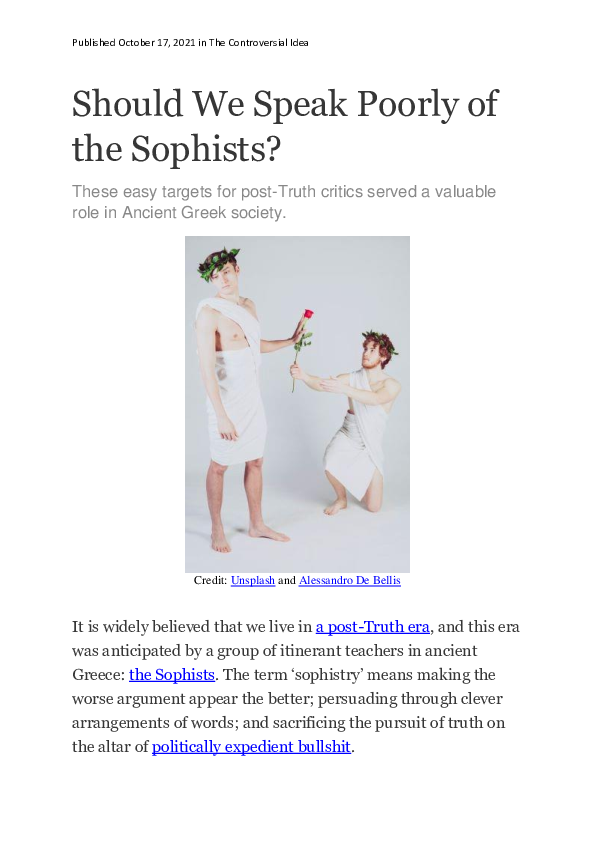Academia.edu no longer supports Internet Explorer.
To browse Academia.edu and the wider internet faster and more securely, please take a few seconds to upgrade your browser.
Should We Speak Poorly of the Sophists?
Should We Speak Poorly of the Sophists?
Should We Speak Poorly of the Sophists?
Should We Speak Poorly of the Sophists?
Should We Speak Poorly of the Sophists?
2021, Medium -- The Controversial Idea
It is widely believed that we live in a post-Truth era, and this era was anticipated by a group of itinerant teachers in ancient Greece: the Sophists. The term ‘sophistry’ means making the worse argument appear the better; persuading through clever arrangements of words; and sacrificing the pursuit of truth on the altar of politically expedient bullshit. Should we blame the Sophists for our current predicament, whereby the truth means so little and success so much? Several Platonic dialogues record Socrates’ interactions with Sophists. So, perhaps their value to ancient Greek society is understated.
Related Papers
History in Dispute: The Ancient World. edd. Miller PA & Platter C, Vol. 20: Classical Antiquity and Classical Studies (Detroit: St. James Press) 172-180.
Greece: SophistsQuarterly Journal of Speech
The Sophistical Attitude and the Invention of Rhetoric2010 •
Traditionally, the Older Sophists were conceived as philosophical skeptics who rejected speculative inquiry to focus on rhetorical methods of being successful in practical life. More recently, this view has been complicated by studies revealing the Sophists to be a diverse group of intellectuals who practiced their art prior to the categorization of “rhêtorikê,” thereby rendering the very meaning of the general term “Sophist” far more problematic. Both perspectives conceal the common attitude that unites the Sophists as a group and is central to understanding their democratic ethos rooted in an experimental attitude that draws on the resources of speculative reason to serve the purpose of radical invention necessary for a democratization of the productive arts. Recovering the professionalism and experimentalism of the Sophists contributes to the democratic project of promoting the productive and collaborative arts—including rhetoric—that employ the resources of theoretical knowledge to inform collective practice and thereby assist in controlling the fortunes of humankind in a changing world
On the role of the Sophists in Greek culture
Philosophy and Political Power in Antiquity
1 The Power of Speech: The Influence of the Sophists on Greek Politics2000 •
Brill’s Companion to George Grote and the Classical Tradition
10 The Sophists in Context: George Grote’s Reappraisal2014 •
Byzantion nea hellás
Plato’s Use of ‘Sophistēs’: Neither Novel nor Distinct nor Derogatory2021 •
In this paper I would like to challenge the received account according to which Plato’s conception of the sophist is either novel, distinct or derogatory. I propose that Plato uses common conceptions of the intellectual to create a rather loose identity for the sophist. Through the available evidence, I hope to show that Plato does not assign a new meaning to the label, but rather uses conventional conceptions of the sophist to create his main argument. I claim that apart from the Sophist, in other dialogues there is no clear conception of what and who the sophist is, no clarity as to what their activity is, and therefore (although there are reasons to suspect about them and their activity), there are no grounds to condemn them. Stemming from a conceptualization of σοφία in terms of knowledge, the σοφιστής is mainly described as someone who knows many things, or an expert in ‘all matters’—a description, we shall see, that precludes finding a single definition. My proposal is that Plato does not construct the hostility against sophists, as some accounts claim, but rather represents this hostility against experts and intellectuals by appealing to popular attitudes against the σοφοί. Importantly, Plato is critical of popular representations of sophists mainly because they are the result of people’s misjudgement or ignorance, from which the prejudice against philosophers also stems.
RELATED PAPERS
2018 •
2017 •
History of Political Thought
Radical Plato: John Stuart Mill, George Grote and the revival of Plato in nineteenth-century England2009 •
The Polish Journal of Aesthetics
The Bullshit Artist: Mystification and Mystagogy2021 •
A History of Western Philosophy of Education in Antiquity
A Story of Educational Philosophy in Antiquity2021 •
Polis: The Journal for Greek Political Thought, Vol. 23/1 (2006)
Rivals in Persuasion: Gorgianic Sophistic Versus Socratic Rhetoric2006 •
Brill's Plato Studies Series
"Kompsoi Logoi. Some remarks on Plato's linguistic conventionalism and its ethical implications", in Bonazzi, M., Ulacco, A., Forcignanò, F., Thinking, Kowing, Acting: Epistemology and Ethics in Plato and Ancient Platonism, Brill, Leiden, 20192019 •
Papers on Rhetoric XI (2012) Università degli Studi di Bologna
Gorgias' Use of Logic and Rhetoric2020 •
Indiana University Press
Politics, Money, and Persuasion: Democracy and Opinion in Plato's Republic2021 •
Philosophy & Rhetoric
Neo-Sophistic Rhetorical Criticism or the Historical Reconstruction of Sophistic Doctrines1990 •
Folia Philosophica, Vol. 42, s. 5—19
The Philosophical Basis of the Method of Antilogic2019 •
2019 •

 Shane J Ralston
Shane J Ralston